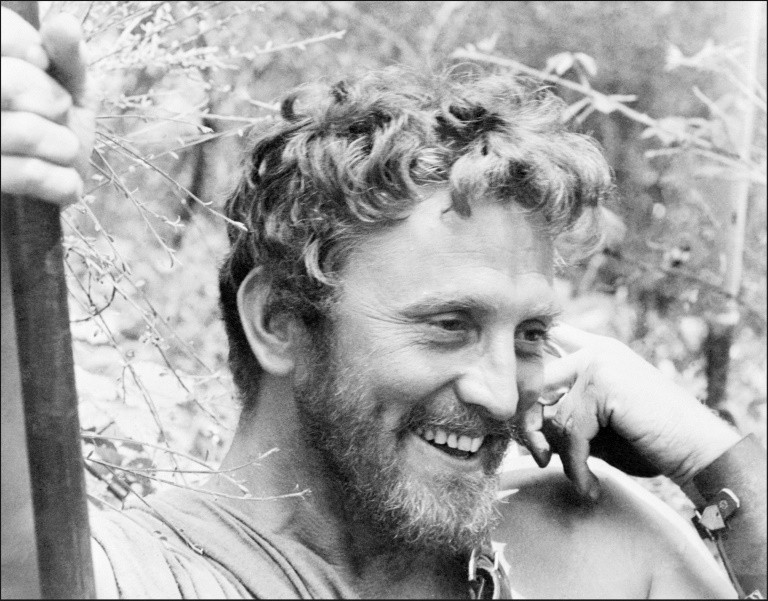Kirk Douglas, one of the last superstars of Hollywood’s golden age of cinema who was renowned for his intense, muscular performances in “Spartacus” and “Paths of Glory,” died Wednesday aged 103.
The US leading man, producer and director came to prominence in the late 1940s and never lost his popularity, taking on nearly 100 movies over a six-decade career that endured beyond a severe stroke in his later years.
His death at his family home in Beverly Hills was confirmed by his son Michael, the Oscar-winning actor and filmmaker.
“It is with tremendous sadness that my brothers and I announce that Kirk Douglas left us today at the age of 103,” Michael Douglas said in a statement posted to Facebook.
“To the world he was a legend, an actor from the golden age of movies who lived well into his golden years.”
Tributes poured in from across Hollywood and around the world on social media, with many declaring “I am Spartacus!” in a nod to Douglas’s legendary role as a rebellious Roman slave.
Director Steven Spielberg said Douglas “retained his movie star charisma right to the end,” while actor Danny DeVito tweeted: “103 years on this earth. That’s got a nice ring to it! Great hanging with you man.”
“Seinfeld” star Jason Alexander praised Douglas as “an absolute legend of a star and human” and added that “we could use a true Spartacus.”
 AFP / Robyn BeckA wreath is placed at Kirk Douglas’s star on the Walk of Fame in Hollywood on February 5 following his death
AFP / Robyn BeckA wreath is placed at Kirk Douglas’s star on the Walk of Fame in Hollywood on February 5 following his deathThe Academy of Motion Picture Arts and Sciences, which awards the Oscars, tweeted: “Goodbye to a Hollywood legend.”
Not unlike his title character in “Spartacus,” Douglas was known throughout his life for his fiercely rebellious streak.
In his early movie days he would clash with studio heads over his choice of roles, before ultimately splitting off to form his own production company, Bryna — one of the first major post-war stars to do so.
“It was pretty rare then,” Variety senior vice president Tim Gray told AFP. “Kirk Douglas was very stubborn but he wasn’t self-indulgent — he wasn’t a party boy wasting people’s time showing up late, things like that.”
– ‘End the blacklist’ –
Douglas also defied more established directors by teaming up with a young Stanley Kubrick for both “Paths of Glory” and “Spartacus.”
 AFP/File / –Kirk Douglas, pictured in an undated photo, was born Issur Danielovitch to Jewish-Russian immigrants in upstate New York in 1916
AFP/File / –Kirk Douglas, pictured in an undated photo, was born Issur Danielovitch to Jewish-Russian immigrants in upstate New York in 1916And on “Spartacus,” Douglas hired Dalton Trumbo — one of the “Hollywood Ten” blacklisted as a suspected communist under the McCarthy era — to write the screenplay.
Unlike many producers during the time, Douglas refused to hide this fact, instead using Trumbo’s real name in the credits.
Gabrielle Carteris, head of Hollywood’s actors union, Wednesday praised Douglas as “a powerful voice who helped end the blacklist in our industry,” as well as “an “extraordinary actor.”
Nonetheless Douglas missed out on taking home the trophy on each of his three Oscar nominations, the last for his performance in the 1956 film “Lust for Life,” and never won a competitive Academy Award.
He was instead granted an honorary lifetime achievement statuette by the Academy in 1996 — just months after his stroke — “for 50 years as a creative and moral force in the motion picture community.”
 AFP/File / GERARD BURKHARTKirk Douglas receives a Life Achievement Award at the Screen Actors Guild Awards in Los Angeles in March 1999
AFP/File / GERARD BURKHARTKirk Douglas receives a Life Achievement Award at the Screen Actors Guild Awards in Los Angeles in March 1999Douglas, born Issur Danielovitch to Jewish-Russian immigrants in upstate New York in 1916, began as a stage actor before serving in the US Navy during the Second World War.
He graduated to movies when “Casablanca” producer Hal Wallis signed him in 1946, and he became a star for his portrayal of a double-crossing and womanizing boxer in 1949’s “Champion.”
His subsequent roles would often mirror his real-world, larger-than-life and intense persona, including Oscar-nominated turns as a ruthless movie producer in “The Bad and the Beautiful” and tortured artist Vincent Van Gogh in “Lust for Life.”
Douglas told The New York Times in a 1984 interview that he had “always been attracted to characters who are part scoundrel,” adding: “I don’t find virtue photogenic.”
– Life well lived –
In his personal life, Douglas married twice, with the second to Anne Buydens in 1954 enduring over 65 years.
Douglas himself would admit to a colorful life as a ladies’ man including affairs in his memoirs, but always carefully controlled his image.
“He was Mr Hollywood, he was always part of the scene — he would always attend functions,” said Gray. “The public saw him as this larger than life actor but he could also be very subtle.”
 AFP/File / VALERIE MACONKirk Douglas is survived by three sons, including the movie star Michael Douglas, pictured, left, with his father in 2018
AFP/File / VALERIE MACONKirk Douglas is survived by three sons, including the movie star Michael Douglas, pictured, left, with his father in 2018Douglas is survived by Buydens, 100, and three of his sons. A fourth child, Eric, died of a drug overdose in his 40s, in 2004.
His son Michael praised Kirk’s “commitment to justice and the causes he believed in” which “set a standard for all of us to aspire.”
He added: “Kirk’s life was well lived, and he leaves a legacy in film that will endure for generations to come.”
AFP

